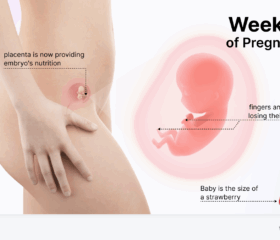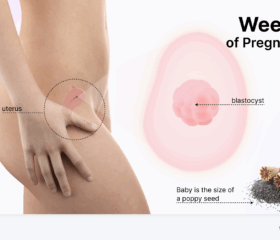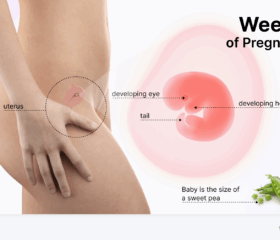Pregnancy Week by Week
18 Weeks Pregnant
Your baby is as big as a bell pepper.
5.5
inches
6.7
ounces
18 Weeks Pregnant: Symptoms, Anatomy Scan, and Tips
You probably know that most pregnancies last around 9 months in total. Doctors generally measure pregnancy in weeks, not months, but being nearly halfway through means you’re about 4.5 months along.
This article will walk you through the developments your baby is undergoing at the 18-week mark and the changes you can expect in your own body. We’ll also provide a few tips on how to keep yourself and your little one healthy and how you can stay as stress-free as possible in this hectic time. Read on for more.
Your baby's development at 18 weeks
Your baby is getting pretty big. He’s just under 6 inches in length, and he weighs around 6.7 ounces, meaning he’s about the size of an artichoke or bell pepper. 1 2
The recent developmental milestones he’s reached include: 3
- Face: Your baby’s facial features are becoming more defined, with his ears starting to stick out from the sides of his head.
- Hearing: On that note, his hearing is also developing rapidly. He can hear sounds from inside your body, such as your heartbeat and digestive noises.
- Skin: Believe it or not, your little one is fuzzy right now, with a fine, downy baby hair called lanugo beginning to cover his skin.
- Internal organs: In your baby’s chest, the lung bulbs that formed in the first trimester are continuing to develop into true airways. His digestive system is processing amniotic fluid (the liquid that surrounds and cushions him in the womb), which helps his GI tract develop. 4
- Reproductive system: If you’re carrying a female fetus, her uterus and fallopian tubes are now in place. If you have a male fetus, his external genitalia have developed enough to be visible on an ultrasound. 5
Your baby is also becoming increasingly active—something you might already know, since many women first start feeling their babies kick, punch, roll, and twist within the womb around this time. These movements, called “quickening,” are often described as flutters or taps, and they’re important for your child’s muscle development. 6
Your baby is also practicing essential reflexes like yawning, swallowing, hiccupping, and sucking. Overall, he’s starting to act a lot more like a fully formed baby. If that seems like exciting news—well, it is! 1

Your body at 18 weeks: physical changes and symptoms
As your baby grows, your body is undergoing its own changes. Your uterus, which you can feel about 1½ inches below your belly button, is expanding rapidly. This means that your belly is probably noticeably growing. In other words, you’ve finally started showing your pregnancy and now have a baby bump.
Every pregnancy is unique, and the size and shape of your bump depends on factors like your body type and whether this is your first baby. If you’ve done this before, your uterus may expand more quickly, whereas if it’s your first time around, you might begin to “show” a bit later.
On that note, if you haven’t already developed stretch marks as your skin accommodates your growing belly, you probably will soon. Many women dread this, but it’s a normal (and inevitable) part of pregnancy. There’s no way to prevent it, although keeping your skin moisturized can help, at least a little. 7
How much weight should you be gaining per week?
You probably already know that you’ll gain weight gradually over the course of your pregnancy. You’ll usually start gaining your pregnancy weight more quickly at this stage.
Exactly how much depends on what your body mass index (BMI) was before you conceived, but women with normal BMIs tend to put on 1 lb per week throughout the course of their second trimesters. 8
Other symptoms and changes in your body at 18 weeks
Many of the roughest pregnancy symptoms, like morning sickness and fatigue, peak in the first trimester. If you’ve finally caught your breath after suffering from them for months, you’ll be happy to know they probably aren’t coming back.
However, you may also experience a range of other symptoms at 18 weeks:
- Backaches: Your growing uterus is shifting your center of gravity, placing more stress on your back. Your body is also producing a hormone called relaxin, which will loosen your ligaments. All of this may cause lower back pain for the duration of your pregnancy. 9
- Heartburn (acid reflux): Your hormonal changes may relax the valve between your esophagus and stomach, allowing your stomach acid to flow back up.
- Increased appetite / cravings: If heartburn is keeping you from eating as much as you’d like, this symptom might be a touch frustrating. Your body needs more energy to support your baby’s growth, which might leave you hungrier than usual. If you haven’t had them already, this might be when your pregnancy cravings start to kick in.
- Leg cramps: These are often caused by dehydration, weight gain, and changes in your circulation.
- Swelling (edema): Your body is probably retaining more fluid than usual. This can make you feel bloated, and may also lead to swollen feet during your pregnancy. 10
- Varicose veins: As unwelcome as they are, it’s not uncommon to develop varicose veins during pregnancy, particularly in your legs. 11
- Nosebleeds or bleeding gums: Hormonal changes can make both your gums and the delicate veins in your nose more sensitive and leave you prone to experiencing nosebleeds and bleeding gums during your pregnancy.
- Dizziness: Changes in your blood volume can cause dizziness. Anemia (iron deficiency) can also contribute to this, so pay attention to your diet. 12
- Vaginal discharge: Your estrogen levels are higher than usual. As a result, you’ll probably have more vaginal discharge when you’re pregnant. Healthy discharge is typically clear or milky white and may be either thin or thick. 13
Track your symptoms with a journal or pregnancy tracker app to note any concerning changes that you may need to bring to your doctor’s attention. The best pregnancy trackers also provide educational content to help you manage these symptoms.
What symptoms require medical attention?
Most of the pregnancy symptoms in the list above are normal, and you don’t need to rush to the doctor if you have any of them (or even all of them). That said, you should get medical attention if you experience:
- Unusual discharge: Vaginal discharge shouldn’t have a smell. If it changes in odor or consistency, especially if that’s accompanied by itching or irritation, see your OB, as it could indicate something’s wrong. Watch out for any color changes, too. For example, yellow discharge during pregnancy could be a sign of an infection brewing.
- Burning during urination: This could also indicate an infection—specifically, a urinary tract infection (UTI). 14
- Heavy bleeding: Some amount of bleeding is relatively normal throughout your pregnancy, but it usually peaks in the first trimester. If you experience anything beyond very light spotting during your pregnancy, see your doctor right away to make sure all’s well with you and your little one.
- Severe swelling: Extreme swelling, particularly in your face, hands, or feet, can be a sign of preeclampsia, a serious complication associated with high blood pressure. 15
- Blurred vision or severe headaches: Having a persistent headache or blurry vision while pregnant is also indicative of preeclampsia.
- Fever: If your temperature hits 100.4°F (38°C) or higher, report that to your healthcare provider. 16
- Major cramping: Persistent or severe pain in your abdomen could indicate a problem.
- Decreased fetal movement: If you notice a significant decrease in your baby’s movements or if he stops moving altogether, contact your doctor immediately. 17
Most types of miscarriages occur in the first trimester, so you’re well past the danger zone at this point. 18 Your odds of experiencing any symptoms that indicate a serious problem are low. Still, it’s important to be vigilant about watching for these so that you can get prompt medical attention if any of them do develop.
How to manage your symptoms at 18 weeks
Assuming your symptoms are more annoying than scary, there are home remedies you can use to alleviate them, at least to an extent. Try these strategies:
Stay hydrated and eat well
The most important tip is also one of the most obvious. Make sure you follow a healthy pregnancy diet with lots of fruits, vegetables, and whole grains, as well as lean proteins. Pay attention to your dietary intake of magnesium and potassium, which can reduce cramping. 19
Relatedly, avoid spicy and fatty foods, try eating smaller, more frequent meals or pregnancy-friendly snacks, and stay upright for a while after eating. All of this will help you avoid heartburn.
Your hydration is just as important as your diet, so drink plenty of water, too.
Be careful about taking herbal supplements
Many women take herbal supplements while they’re pregnant to help them manage their symptoms and support their growing babies. Some supplements are safe, but others can be harmful, so you should always consult with your healthcare provider before taking anything. When in doubt, just avoid them—prenatal vitamins, prescribed by your doctor, are all you really need.
Get regular but moderate exercise
You shouldn’t overdo it, but staying active has a lot of benefits. It can improve your mood, reduce your back pain, and help you sleep better. Safe options include walking and swimming. There are plenty of benefits of prenatal yoga, too. 20
After you exercise, stretch your calf muscles to ward off those pregnancy cramps, and try to maintain a good posture even when you aren’t working out.
Don’t neglect your rest
The idea that you have to put actual work into resting might seem counterintuitive, but everything gets a little more complicated when you’re pregnant, and this is no exception. Follow these strategies:
- Sitting: Use an ergonomic chair with enough back support to prevent backaches.
- Sleeping: Establish a relaxing bedtime routine (e.g., by avoiding screens for a few hours before bed), and use supportive pregnancy pillows if you need them. Aim for 7–9 hours of sleep per night. If you’re a back-sleeper, you’ll be disappointed to know that this is one of the worst pregnancy sleeping positions. Sleeping on your side is the way to go.
Whatever position you’re in, if your legs hurt, try elevating them and wearing compression socks.
What to expect from your next prenatal visit and anatomy scan
Even if you don’t have any worrying symptoms that send you to the doctor, you’ll probably pay them a visit in the next couple of weeks for a routine prenatal check.
This is an important visit. Around the time you’re 18 to 20 weeks pregnant, you’ll typically have a detailed ultrasound, often referred to as the anatomy scan. This screening will serve to thoroughly assess your baby’s growth.
During this ultrasound, the sonographer (ultrasound technician) will examine your: 12
- Baby’s features: They’ll check the structure of your baby’s major organs, such as his brain, kidneys, and heart. They’ll monitor his heartbeat and check his external features, such as his limbs.
- Amniotic fluid: They will assess the amount of amniotic fluid surrounding your baby to make sure he’s growing in a healthy environment.
- Placenta: The sonographer will also examine your own body. In particular, they’ll pay attention to your placenta to confirm that it’s in the right place and has no abnormalities.
If you’re carrying multiples (twins, triplets, etc.), they’ll assess each baby individually during the anatomy scan.
Determining your baby’s sex
If you want to know whether you’re having a boy or a girl, this next prenatal visit could be the day when you find out your baby’s sex. Your sonographer can look for differences on the gender scan to determine it.
They’re usually able to tell this with high accuracy at this stage, provided your baby’s in a favorable position. That said, sometimes, babies don’t cooperate, and yours might not be positioned in a way that lets them see the genitalia.
Assuming your baby plays along, it’s entirely up to you whether or not you want to be told what their sex is. Just tell the sonographer at the beginning of your visit (there’s a good chance they’ll ask without you even bringing it up).
Tips and advice for your 18th week
As your pregnancy progresses and your due date draws closer, there are a few things you should start thinking about:
- Getting maternity clothes: As your belly grows, you’ll find that your regular clothes become uncomfortable, which is a good sign it’s time to start wearing maternity clothes. Investing in supportive maternity wear can make a significant difference to your comfort level.
- Enrolling in childbirth classes: There’s no law saying you have to do this, but many first-time parents choose to. These classes will teach you about labor, delivery, and newborn care.
- Taking maternity leave: Research your options for leave. If your workplace has an HR department, you can swing by and ask them about this. They might recommend starting in on any required paperwork already.
Is now a good time to announce your pregnancy?
If you haven’t done this yet, it’s about time to give your family and friends the big news—after all, it won’t be long until your growing bump takes the matter out of your hands! As mentioned, now’s probably around when you should think about telling people at your workplace as well.
If you have other children, think about the best way to break the news to them, and get them involved in the preparations for the new baby in an age-appropriate way. Their lives are about to change, too, and this will help them emotionally prepare.
Final thoughts
Again, your 18th week is the halfway point of your pregnancy, which is a huge milestone. Congratulations!
You have a bit of homework to do as your preparations become more immediate. Make sure to treat yourself to something nice, even if it’s just a couple of evenings where you let yourself relax and don’t make yourself do any chores.
As always, keep an open line of communication with your doctor, partner, family, and friends. If you catch yourself talking to your baby, don’t be embarrassed—you’re far from alone in that, and like we said, before too long, he just might be able to hear you.
Article Sources
- OhioHealth. "How Big is My Baby? An Easy Week to Week Growth Guide" Retrieved June 24, 2025.
- Baby Your Baby. "Fetal Growth Chart" Retrieved June 24, 2025.
- Cleveland Clinic. "Fetal Development" Retrieved June 24, 2025.
- American College of Obstetricians and Gynecologists. "Changes During Pregnancy" Retrieved June 24, 2025.
- Eunice Kennedy Shriver National Institute of Child Health and Human Development. "Pregnancy" Retrieved June 24, 2025.
- Cleveland Clinic. "Quickening in Pregnancy" Retrieved June 24, 2025.
- American College of Obstetricians and Gynecologists. "What causes stretch marks during pregnancy?" Retrieved June 24, 2025.
- MedlinePlus. "Managing your weight gain during pregnancy" Retrieved June 24, 2025.
- Johns Hopkins Medicine. "Back Pain in Pregnancy" Retrieved June 24, 2025.
- The University of Texas Southwestern Medical Center. "5 ways to manage swollen legs and feet during pregnancy" Retrieved June 24, 2025.
- Nemours KidsHealth. "Why Do Some Pregnant Women Get Varicose Veins?" Retrieved June 24, 2025.
- Penn Medicine. "News and views" Retrieved June 24, 2025.
- Virtua Health. "What To Know About Vaginal Discharge During Pregnancy" Retrieved June 24, 2025.
- Tommy’s. "Painful urination in pregnancy" Retrieved June 24, 2025.
- MedlinePlus. "Aches and pains during pregnancy" Retrieved June 24, 2025.
- U.S. Centers for Disease Control and Prevention. "Signs and Symptoms of Urgent Maternal Warnings Signs" Retrieved June 24, 2025.
- Tommy’s. "Baby movements in pregnancy" Retrieved June 24, 2025.
- MedlinePlus. "Miscarriage" Retrieved June 24, 2025.
- The University of New Mexico. "What Causes Leg Cramps in Pregnancy?" Retrieved June 24, 2025.
- U.S. Centers for Disease Control and Prevention. "Pregnant & Postpartum Activity: An Overview" Retrieved June 24, 2025.







